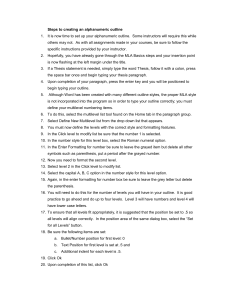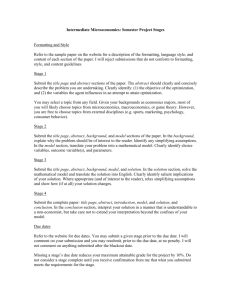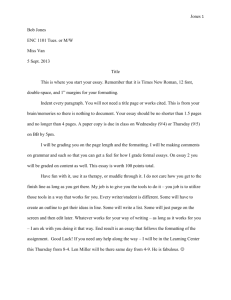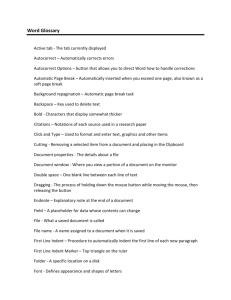NAME SYNOPSIS
advertisement
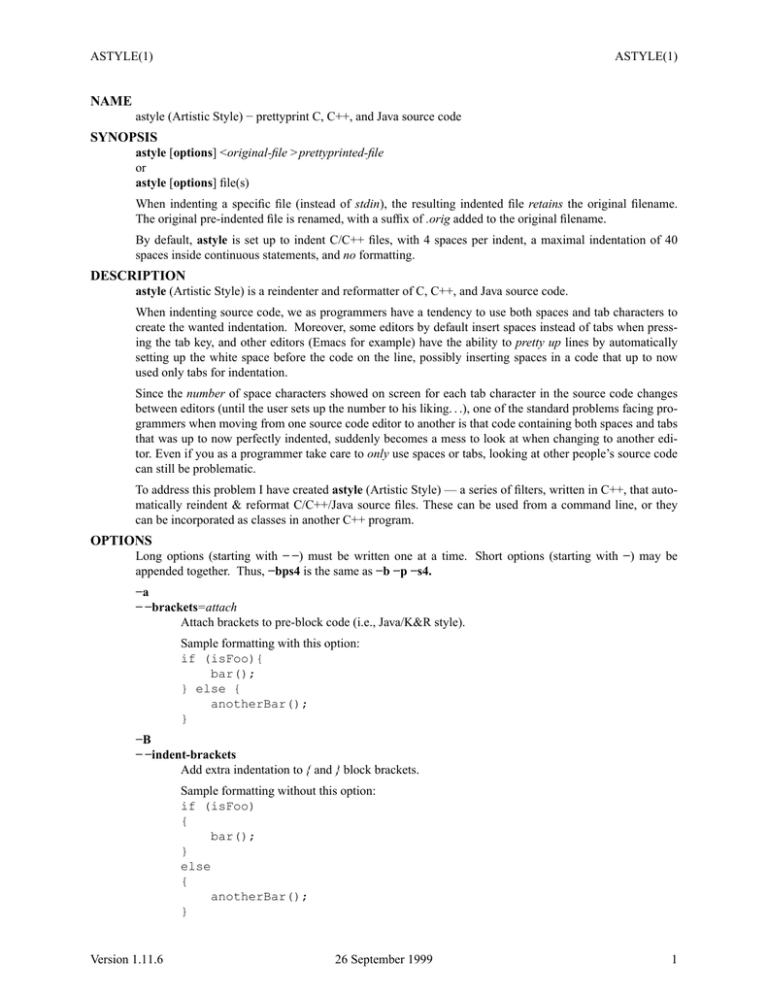
ASTYLE(1)
ASTYLE(1)
NAME
astyle (Artistic Style) − prettyprint C, C++, and Java source code
SYNOPSIS
astyle [options] <original-file > prettyprinted-file
or
astyle [options] file(s)
When indenting a specific file (instead of stdin), the resulting indented file retains the original filename.
The original pre-indented file is renamed, with a suffix of .orig added to the original filename.
By default, astyle is set up to indent C/C++ files, with 4 spaces per indent, a maximal indentation of 40
spaces inside continuous statements, and no formatting.
DESCRIPTION
astyle (Artistic Style) is a reindenter and reformatter of C, C++, and Java source code.
When indenting source code, we as programmers have a tendency to use both spaces and tab characters to
create the wanted indentation. Moreover, some editors by default insert spaces instead of tabs when pressing the tab key, and other editors (Emacs for example) have the ability to pretty up lines by automatically
setting up the white space before the code on the line, possibly inserting spaces in a code that up to now
used only tabs for indentation.
Since the number of space characters showed on screen for each tab character in the source code changes
between editors (until the user sets up the number to his liking. . .), one of the standard problems facing programmers when moving from one source code editor to another is that code containing both spaces and tabs
that was up to now perfectly indented, suddenly becomes a mess to look at when changing to another editor. Even if you as a programmer take care to only use spaces or tabs, looking at other people’s source code
can still be problematic.
To address this problem I have created astyle (Artistic Style) — a series of filters, written in C++, that automatically reindent & reformat C/C++/Java source files. These can be used from a command line, or they
can be incorporated as classes in another C++ program.
OPTIONS
Long options (starting with − −) must be written one at a time. Short options (starting with −) may be
appended together. Thus, −bps4 is the same as −b −p −s4.
−a
− −brackets=attach
Attach brackets to pre-block code (i.e., Java/K&R style).
Sample formatting with this option:
if (isFoo){
bar();
} else {
anotherBar();
}
−B
− −indent-brackets
Add extra indentation to { and } block brackets.
Sample formatting without this option:
if (isFoo)
{
bar();
}
else
{
anotherBar();
}
Version 1.11.6
26 September 1999
1
ASTYLE(1)
ASTYLE(1)
Sample formatting with this option:
if (isFoo)
{
bar();
}
else
{
anotherBar();
}
−b
− −brackets=break
Break brackets from pre-block code (i.e., ANSI C/C++ style).
Sample formatting with this option:
if (isFoo)
{
bar();
}
else
{
anotherBar();
}
−C
− −indent-classes
Indent class blocks, so that the inner public:, protected:, and private: headers are indented in relation to the class block.
Sample formatting without this option:
class Foo
{
public:
Foo();
virtual ˜Foo();
};
Sample formatting with this option:
class Foo
{
public:
Foo();
virtual ˜Foo();
};
−c
− −mode=c
Indent a C or C++ source file (default).
−E
− −fill-empty-lines
Fill empty lines with the white space of their previous lines.
−G
− −indent-blocks
Add extra indentation for entire blocks (including brackets).
Sample formatting without this option:
if (isFoo)
{
Version 1.11.6
26 September 1999
2
ASTYLE(1)
ASTYLE(1)
bar();
}
else
anotherBar();
Sample formatting with this option:
if (isFoo)
{
bar();
}
else
anotherBar();
−h
−?
− −help
Print help message on stderr.
−j
− −mode=java
Indent a Java(TM) source file.
−K
− −indent-cases
Indent case XXX: lines, so that they are flush with their bodies.
Sample formatting without this option:
switch (foo)
{
case 1:
{
a += 2;
break;
}
default:
{
a += 2;
break;
}
}
Sample formatting with this option:
switch (foo)
{
case 1:
{
a += 2;
break;
}
default:
{
a += 2;
break;
}
}
−L
Version 1.11.6
26 September 1999
3
ASTYLE(1)
ASTYLE(1)
− −indent-labels
Indent labels so that they appear one indent less than the current indentation level, rather than
being flushed completely to the left (which is the default).
Sample formatting without this option:
int foospace()
{
while (isFoo)
{
...
goto error;
error:
...
}
}
Sample formatting with this option:
int foospace()
{
while (isFoo)
{
...
goto error;
error:
...
}
}
−l
− −brackets=linux
Break definition-block brackets and attach command-block brackets.
Sample formatting with this option:
namespace foospace
{
int Foo()
{
if (isBar) {
bar();
return 1;
} else
return 0;
}
}
−M#
− −max-instatement-indent=#
Indent a maximal # spaces in a continuous statement, relatively to the previous line.
−m
− −min-conditional-indent=#
Indent a minimal # spaces in a continuous conditional belonging to a conditional header.
Sample formatting without this option:
// default setting makes this non-bracketed code clear
if (a < b
|| c > d)
foo++;
// but creates an exaggerated indent in this bracketed code
Version 1.11.6
26 September 1999
4
ASTYLE(1)
ASTYLE(1)
if (a < b
|| c > d)
{
foo++;
}
Sample formatting with − −min-conditional-indent=0:
// setting makes this non-bracketed code less clear
if (a < b
|| c > d)
foo++;
// but makes this bracketed code prettier
if (a < b
|| c > d)
{
foo++;
}
−N
− −indent-namespaces
Indent the contents of namespace blocks.
Sample formatting without this option:
namespace foospace
{
class Foo
{
public:
Foo();
virtual ˜Foo();
};
}
Sample formatting with this option:
namespace foospace
{
class Foo
{
public:
Foo();
virtual ˜Foo();
};
}
−O
− −one-line=keep-blocks
Don’t break blocks residing completely on one line.
−o
− −one-line=keep-statements
Don’t break lines containing multiple statements into multiple single-statement lines.
−P
− −pad=all
Insert space paddings around operators and parentheses.
Sample formatting without this option:
if (isFoo)
a = bar((b-c)*a,*d--);
Sample formatting with this option:
Version 1.11.6
26 September 1999
5
ASTYLE(1)
ASTYLE(1)
if ( isFoo )
a = bar( ( b - c ) * a, *d-- );
−p
− −pad=oper
Insert space paddings around operators only.
Sample formatting without this option:
if (isFoo)
a = bar((b-c)*a,*d--);
Sample formatting with this option:
if (isFoo)
a = bar((b - c) * a, *d--);
− −pad=paren
Insert space paddings around parentheses only.
Sample formatting without this option:
if (isFoo)
a = bar((b-c)*a,*d--);
Sample formatting with this option:
if ( isFoo )
a = bar( ( b-c )*a, *d-- );
−S
− −indent-switches
Indent switch blocks, so that the inner case XXX: headers are indented in relation to the switch
block.
Sample formatting without this option:
switch (foo)
{
case 1:
a += 2;
break;
default:
a += 2;
break;
}
Sample formatting with this option:
switch (foo)
{
case 1:
a += 2;
break;
default:
a += 2;
break;
}
−s
−s#
− −indent=spaces=#
Indent using # spaces per indent. Not specifying # will result in a default of 4 spaces per indent.
− −style=ansi
− −style=kr
Version 1.11.6
26 September 1999
6
ASTYLE(1)
ASTYLE(1)
− −style=gnu
− −style=java
− −style=linux
Choose ANSI, Kernighan & Ritchie, GNU, Java, or GNU/Linux style prettyprinting.
− −suffix=####
Append the suffix #### instead of .orig to the original filenames.
−t
−t#
− −indent=tab=#
Indent using tab characters, assuming that each tab is # spaces long. Not specifying # will result in
a default assumption of 4 spaces per tab.
−v
− −version
Print version number on stderr.
−X
− −errors-to-standard-output
Print errors and help information to stdout, rather than to stderr.
DEFAULT OPTIONS
astyle looks for a default options file in the following order:
1.
The contents of the file named by the ARTISTIC_STYLE_OPTIONS environment variable, if that
variable exists.
2.
The file called .astylerc in the directory pointed to by the HOME environment variable (i.e.,
$HOME/.astylerc).
3.
The file called .astylerc in the directory pointed to by the HOMEPATH environment variable (i.e.,
$HOMEPATH/.astylerc).
At most one default options file is processed, and if one is found, the options in it will be parsed before the
command-line options.
Options within the default option file may be written without the preliminary − or − −.
Options may be set apart by newlines, tabs or spaces.
Long options may be written in the options file without the preceding − −.
Lines within the options file that begin with # are considered comments.
Here is a sample default options file:
# default parsing is of java files
mode=java
# brackets should be attached to pre-bracket lines
brackets=attach
# set 6 spaces per indent
indent=spaces=6
# indent switch blocks
indent-switches
# suffix of original files should be .pre
suffix=.pre
STYLE SAMPLES
Here are samples of each of the supported formatting styles:
− −style=ansi
ANSI style formatting/indenting.
namespace foospace
{
Version 1.11.6
26 September 1999
7
ASTYLE(1)
ASTYLE(1)
int Foo()
{
if (isBar)
{
bar();
return 1;
}
else
return 0;
}
}
− −style=kr
Kernighan & Ritchie style formatting/indenting.
namespace foospace {
int Foo() {
if (isBar) {
bar();
return 1;
} else
return 0;
}
}
− −style=linux
GNU/Linux style formatting/indenting (brackets are broken apart from class/function declarations,
but connected to command lines, and indents are set to 8 spaces).
namespace foospace
{
int Foo()
{
if (isBar) {
bar();
return 1;
} else
return 0;
}
}
− −style=gnu
GNU style formatting/indenting.
namespace foospace
{
int Foo()
{
if (isBar)
{
bar();
return 1;
}
else
return 0;
}
}
Version 1.11.6
26 September 1999
8
ASTYLE(1)
ASTYLE(1)
− −style=java
Java style formatting/indenting.
class foospace {
int Foo() {
if (isBar) {
bar();
return 1;
} else
return 0;
}
}
ENVIRONMENT VARIABLES
ARTISTIC_STYLE_OPTIONS Primary default option filename.
HOME
Secondary default option file directory ($HOME/.astylerc).
HOMEPATH
Tertiary default option file directory ($HOMEPATH/.astylerc).
SEE ALSO
awkpretty(1), html-pretty(1), indent(1), pindent(1), pretty(1), sf3pretty(1), tex-pretty(1).
AUTHOR
Tal Davidson
Israel
email: davidsont@bigfoot.com
WWW URL: http://astyle.sourceforge.net/astyle
Version 1.11.6
26 September 1999
9

